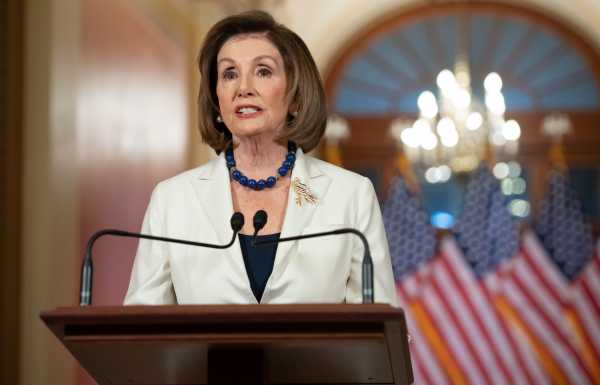
The impeachment train is moving full steam ahead — and the next step for House Democrats is to actually write up what they’re impeaching President Trump for, Speaker Nancy Pelosi announced Thursday morning.
“The president’s actions are a profound violation of the public trust,” Pelosi said. “His wrongdoing strikes at the very heart of our Constitution.” So, she concluded, “Today, I am asking our chairmen to proceed with articles of impeachment.”
These articles will be, essentially, the “charges” against the president that the House of Representatives will draw up, and then vote on, deciding whether to send them to the Senate for a trial.
The process of writing them will be handled by the House Judiciary Committee and its chair Jerry Nadler (D-NY) in the coming days, though Pelosi’s language about “chairmen” implies a role for House Intelligence Committee Chair Adam Schiff (D-CA) as well. And while Democrats haven’t officially confirmed the content of any article, Wednesday’s hearing offered some clues on what the Judiciary Committee may be thinking.
As CNN’s Jeremy Herb pointed out, Democrats displayed a slide listing “impeachable offenses.” First was “abuse of power and bribery,” second was “obstruction of Congress,” and third was “obstruction of justice.”
Earlier this week, NBC’s Heidi Przybyla reported that she was hearing a very similar breakdown from her Judiciary Committee sources. She wrote that, while their thinking was still developing, they were considering:
- One or two articles on abuse of power and potentially bribery (focusing on Trump’s effort to withhold a White House meeting and military aid from Ukraine, unless the Ukrainians investigated the Bidens)
- One article on contempt and obstruction of Congress, “based on the admin stonewalling ALL congressional oversight”
- And one article “related to the Mueller report and Obstruction of Justice”
As Przybyla’s reporting suggests, Democrats have to decide on one key question in particular — Do they focus their articles entirely on the Ukraine scandal, or do they go broader?
But it seems that the number of articles drawn up by the Judiciary will likely end up being two to four. That fits with our two modern examples of presidential impeachment inquiries. For Richard Nixon in 1974, the House Judiciary Committee drew up five articles of impeachment and approved three of them. For Bill Clinton in 1998, the Judiciary Committee drew up four articles and approved them all.
Now, that’s not the last stage in the process — it’s possible for the Judiciary Committee to draft some articles that are then rejected by the full House. That’s what happened with Clinton — the full House approved two of the four proposed articles, and rejected the other two. But if even one article of impeachment is approved, that means the president is impeached, and that the process will then move to the Senate for a trial.
All in all, the decision to move to drafting articles of impeachment is another sign that Democrats are moving ahead with a swift impeachment effort — one that will likely conclude in the House before the end of the year, setting the stage for a Senate trial in January.
Past presidential articles of impeachment, explained
If the House Judiciary Committee follows modern practice, it won’t take very long to write these articles of impeachment — because the impeachment articles for Richard Nixon and Bill Clinton were all quite brief.
That is: they aren’t written as dense legislative text. And they don’t lay out the actual evidence the House has found. Instead, the articles simply sum up the offense the president is charged with. We’re talking a few hundred words each. (You can read Nixon’s here, and Clinton’s here.)
The Constitution says a president can only be impeached for “treason,” “bribery,” or “other high Crimes and Misdemeanors,” so each article is designed to charge one of those offenses.
For Nixon, the Judiciary Committee approved three articles: one alleging obstruction of justice, one alleging abuse of power, and one alleging contempt of Congress. The committee rejected two other articles: one on usurping the powers of Congress, and one accusing Nixon of tax fraud. (Nixon then resigned before the full House could vote to impeach him.)
Here’s one relevant excerpt from the beginning of Article 1, describing the Watergate break-in and accusing Nixon of covering it up.
For Clinton, the Judiciary Committee approved four articles. Two, a perjury count and an obstruction of justice count, were then approved by the full House. The two other articles, another perjury count and an abuse of office count, were rejected.
Here’s an excerpt of Article 1 from the Clinton impeachment, which was approved by the House, accusing him of lying to the grand jury about his affair with Monica Lewinsky.
What the articles of impeachment against Trump may say
Earlier this week, Adam Schiff’s Intelligence Committee released a report on their findings in the impeachment inquiry so far — a report that was divided into two parts.
The first part, titled “The President’s Misconduct,” had the topline summary: “The President Conditioned a White House Meeting and Military Aid to Ukraine on a Public Announcement of Investigations Beneficial to his Reelection Campaign.”
That could well be the gist of one article of impeachment, the one the Judiciary Committee’s slide called “abuse of power & bribery.” This article could sum up the basic facts of the Ukraine scandal so far. It is also possible that there could be separate articles summarizing the same basic facts but with a different “offense” — for instance, one focusing on abuse of power, and the other focusing on bribery.
The second part of Schiff’s report was titled “The President’s Obstruction of the House of Representatives’ Impeachment Inquiry.” The topline summary here is: “The President Obstructed the Impeachment Inquiry by Instructing Witnesses and Agencies to Ignore Subpoenas for Documents and Testimony.” So, that will likely be its own article.
Then, the other report in play for a potential impeachment article is the Mueller report — specifically, Volume II of that report, which describes Mueller’s findings on whether President Trump obstructed justice by interfering with the Russia investigation.
Mueller collected evidence on matters such as Trump’s attempt to get FBI director James Comey to drop an investigation into Michael Flynn (which failed), Trump’s attempts to get then-Attorney General Jeff Sessions to reverse his recusal from oversight over the Russia probe (which failed), Trump’s firing of Comey, Trump’s order to White House Counsel Don McGahn to fire Mueller (which failed), and Trump and his legal team’s urging key figures (like Paul Manafort) not to flip while attacking those who did flip (like Michael Cohen).
The tricky part here is that Mueller declined to outright say whether any of this rose to the level of obstruction of justice — in part, he said, because Justice Department guidelines state he shouldn’t indict a sitting president. That would leave it up to Democrats to decide which of this conduct is obstructive, and which merits inclusion in an article of impeachment — if they decide to focus one on the Mueller report at all.
Sourse: vox.com




